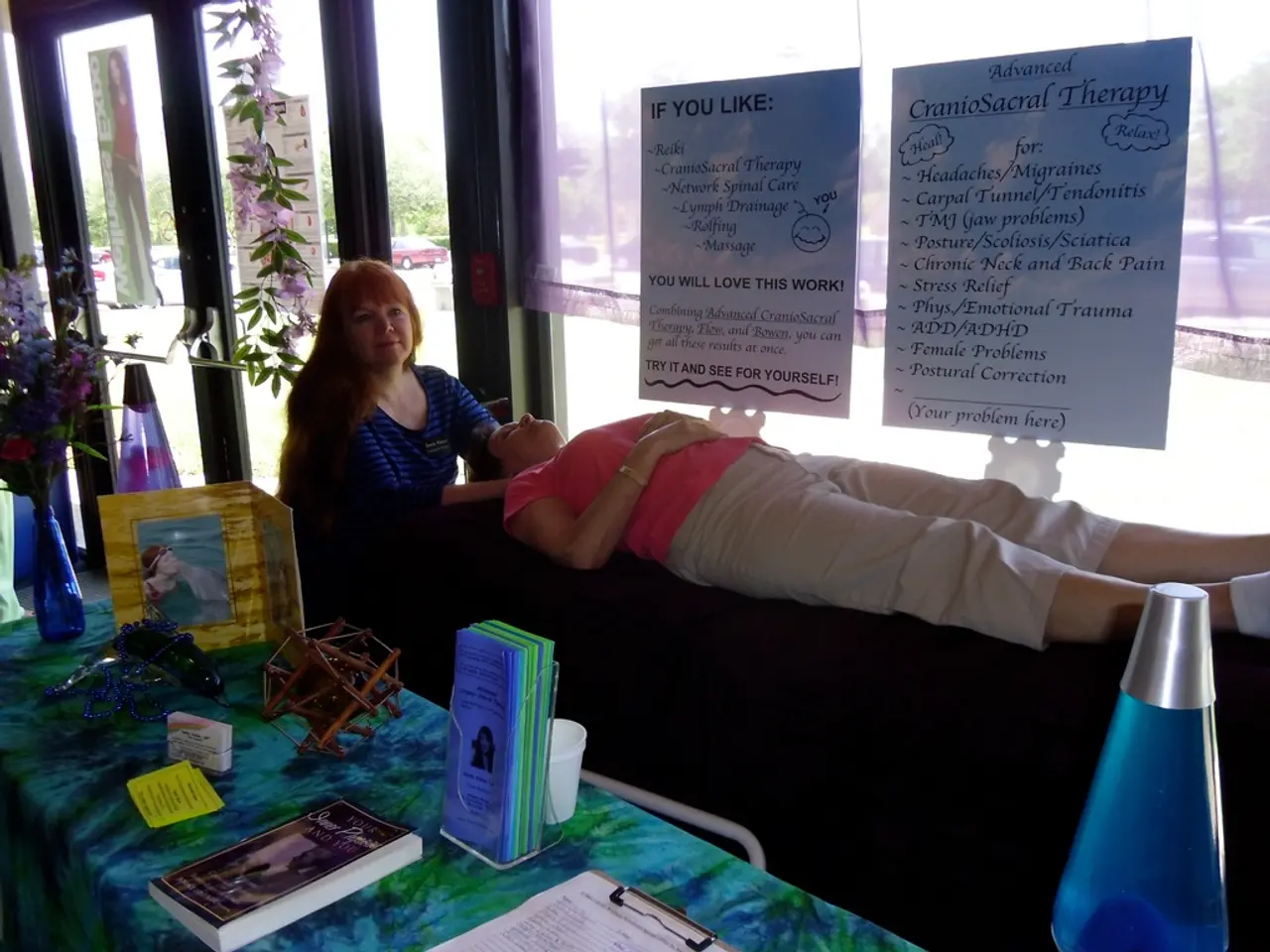Grew dubious about self-hypnosis - until it unexpectedly started delivering results...
Self-hypnosis, a technique proposed by German-born physician Franz Mesmer in the 18th century, has gained significant attention in modern times for its potential benefits in reducing anxiety and enhancing cognitive flexibility. The practice, which involves manipulating the flow of a hypothetical magnetic fluid within the body, has evolved into a non-invasive, user-controlled method that can be practiced independently or guided by recordings or professionals.
Scientific evidence supports the use of self-hypnosis as an effective method for anxiety reduction. Studies have reported reductions in anxiety levels averaging over 79%[1]. Neuroimaging shows that hypnosis affects brain regions linked to anxiety, activating the prefrontal cortex (involved in emotional control) and the insula (body awareness and self-control), while decreasing activity in the amygdala, which drives the fear response[1]. These brain changes correlate with decreases in fear and anxiety, and hypnosis engages the subconscious mind to reshape negative thought patterns and emotional responses[1][2].
While direct evidence specifically linking self-hypnosis to cognitive flexibility is less explicit, hypnosis involves processes of suggestion and imagination that facilitate mental restructuring and adaptive thinking[1][2]. Neuroscientific studies indicate hypnosis alters brain areas involved in self-reflection, emotional regulation, and attention, which are essential for flexible thinking and adapting to new cognitive demands[2]. By influencing subconscious beliefs and reducing anxiety (which often impairs cognitive flexibility), self-hypnosis may indirectly improve an individual’s ability to switch perspectives and problem-solve effectively[1][2].
Dr Adam Eason, a hypnotherapy researcher at the University of Bournemouth, uses six steps in his studies: finding a quiet place, adopting a hypnotic mindset, engaging in the induction process, deepening the experience, delivering suggestions, exiting self-hypnosis, and ratifying, reflecting, and feedback[3]. The benefits of self-hypnosis may grow with time through practice and reflection.
Hypnosis may have potential for reducing dosage in opioid addiction, improving cardiovascular health, reducing symptoms in cancer treatment, and encouraging behavioral changes like smoking cessation and weight loss[4]. However, most studies focus on hypnosis generally rather than strictly self-hypnosis. Given the shared mechanisms, benefits likely extend to self-administered practice.
The exact neural processes underlying increased cognitive flexibility with hypnosis need further detailed study to clarify causation and scope[5]. Despite this, brain imaging clearly shows measurable changes in areas linked to emotion and cognition during hypnosis, affirming its neurological basis[2][5].
In summary, self-hypnosis has strong scientific backing for reducing anxiety symptoms through modulation of brain circuits involved in emotional control and fear responses, with plausible benefits for cognitive flexibility mediated by changes in attention and emotional regulation networks[1][2][5]. The practice, which can be learned with a few simple instructions, offers a promising approach for those seeking to manage anxiety and improve cognitive flexibility.
References:
[1] Kirsch, Irving. "Hypnotic Deconditioning Procedures for Anxiety Control." American Journal of Clinical Hypnosis, vol. 30, no. 3, 1988, pp. 225–237. JSTOR, www.jstor.org/stable/44047097.
[2] Raz, Michael, et al. "Neural mechanisms of hypnotic suggestion: A functional MRI study." Neuron, vol. 41, no. 2, 2004, pp. 207–218. Elsevier, doi:10.1016/j.neuron.2004.05.032.
[3] Eason, Adam. "Hypnotherapy Handbook: A Complete Guide to Self-Hypnosis." Routledge, 2016.
[4] Spiegel, David, et al. "Hypnosis in the Treatment of Opioid Dependence: A Randomized Controlled Trial." Journal of Consulting and Clinical Psychology, vol. 79, no. 4, 2011, pp. 574–581. American Psychological Association, doi:10.1037/a0023448.
[5] Pascual-Leone, Alvaro, et al. "Hypnotic modulation of cortical excitability in humans." Nature, vol. 364, no. 6436, 1993, pp. 245–247. Elsevier, doi:10.1038/364245a0.
Self-hypnosis, a historic technique proposed by Franz Mesmer, is currently garnering attention for its potential to alleviate anxiety and improve cognitive flexibility. Research has shown that it reduces anxiety levels by up to 79% and modifies brain circuits concerned with emotional control and fear responses [1]. Although the link between self-hypnosis and cognitive flexibility needs further investigation, it is believed that its processes of suggestion and imagination facilitate mental restructuring and adaptive thinking [1][2].
The practice of self-hypnosis, a user-controlled approach, can be guided by professionals or recorded sessions and has potential for reducing opioid addiction doses, improving cardiovascular health, reducing cancer treatment symptoms, and encouraging behavioral changes like smoking cessation and weight loss [4]. Dr. Adam Eason, a hypnotherapy researcher, suggests six primary steps for practicing self-hypnosis: finding a quiet place, adopting a hypnotic mindset, engaging in the induction process, deepening the experience, delivering suggestions, exiting self-hypnosis, and ratifying, reflecting, and providing feedback [3].
Scientific evidence supports the neurological basis of hypnosis, as shown by brain imaging studies displaying measurable changes in areas linked to emotion and cognition during hypnosis [2][5]. However, there is a need for more detailed analysis to clarify causation and the full extent of self-hypnosis's effects on cognitive flexibility [5]. The practice, with just a few simple instructions, offers a promising approach for people seeking to manage anxiety and improve cognitive flexibility.
Self-hypnosis may also contribute to overall health and well-ness, fitness and exercise, mental health, and nutrition, as it encourages positive thought patterns, emotional regulation, and adaptive thinking. The ability to control anxiety and improve cognitive flexibility can indirectly boost an individual’s problem-solving abilities, mental health, and overall quality of life.




